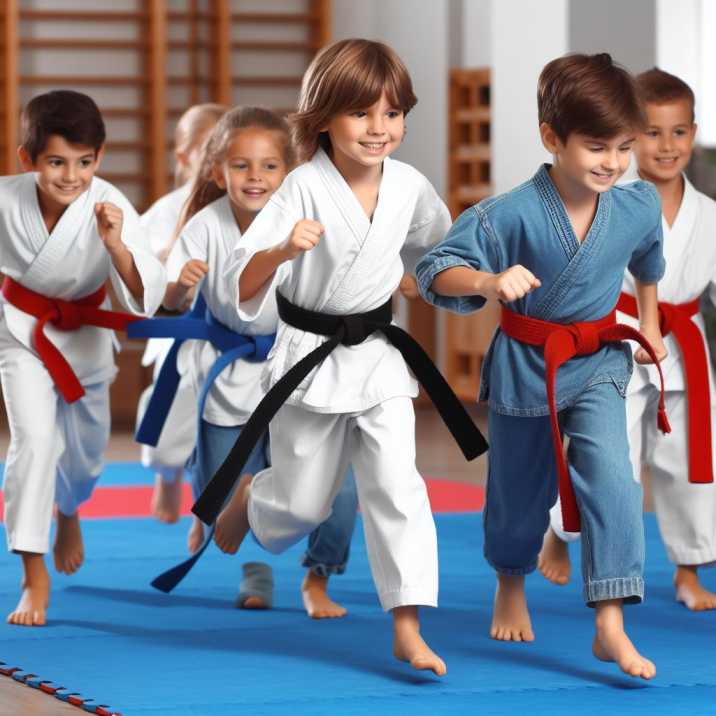Introduction:
Table of Contents
Are you a martial arts instructor looking for exciting ways to engage your young students? Look no further! In this comprehensive guide, we’ll explore a variety of martial arts games for children’s classes. From enhancing coordination to teaching discipline, these games offer a perfect blend of fun and learning.
Importance of Games in Martial Arts Education
Martial arts games play a crucial role in children’s classes, offering numerous benefits beyond just physical exercise. These games help improve focus, discipline, and coordination in young learners. By making learning enjoyable, games also enhance retention and motivation among students.
Essential Skills Targeted by Martial Arts Games
Martial arts games are carefully crafted to target specific skills essential for a child’s development. These include balance, coordination, agility, focus, and spatial awareness. By integrating these skills into gameplay, children not only improve their martial arts abilities but also enhance their overall physical and mental wellbeing.
Engaging Martial Arts Games for Children’s classes
Let’s explore some exciting martial arts games for children’s classes:
- Belt Relay: A team-based game where students race to pass a belt from one teammate to another without using their hands, promoting teamwork and agility.
- Ninja Dodgeball: A martial arts twist on the classic dodgeball game, emphasizing evasion and quick reflexes.
- Obstacle Course: Design a course incorporating various martial arts techniques and challenges to test agility, balance, and coordination.

Incorporating Educational Elements into Games
While martial arts games are inherently enjoyable, instructors can also incorporate educational elements to enhance the learning experience. For example, games can focus on teaching specific techniques, terminology, or historical aspects of martial arts. This integration of education with entertainment ensures that children not only have fun but also gain valuable knowledge during class.
Creating a Positive Learning Environment
Martial arts classes for children should prioritize creating a positive and inclusive environment where every student feels motivated and supported. Instructors can achieve this by offering praise and encouragement, emphasizing effort over perfection, and fostering a sense of camaraderie among students. Positive reinforcement and constructive feedback are essential tools for building confidence and self-esteem in young learners.
Safety Considerations in Martial Arts Games
Safety should always be a top priority when organizing martial arts games for children. Instructors must assess the physical abilities of their students and adapt games accordingly to prevent injuries. Additionally, ensuring proper supervision, providing clear instructions, and maintaining a safe practice area are essential for a risk-free gaming experience.
Benefits of Interactive Learning in Martial Arts
Interactive learning through martial arts games offers numerous benefits for children’s development. Unlike traditional teaching methods, interactive games actively engage children, promoting better retention of skills and concepts. Moreover, these hands-on activities foster a deeper understanding of martial arts principles and encourage creativity and problem-solving skills.
Promoting Physical Fitness Through Games
Martial arts games not only enhance martial arts skills but also contribute to children’s overall physical fitness. These games involve a combination of cardiovascular exercise, strength training, and flexibility, leading to improved endurance and stamina. By making fitness fun and enjoyable, children are more likely to develop lifelong habits of physical activity.
Tailoring Games for Different Age Groups
One size does not fit all when it comes to martial arts games for children’s classes. Instructors should consider the age and skill level of their students when selecting games and adjusting difficulty levels accordingly. Younger children may benefit from simpler games focusing on basic motor skills, while older children can engage in more complex challenges that test their martial arts proficiency.
Encouraging Participation and Inclusivity
Inclusive participation is key to the success of martial arts games in children’s classes. Instructors should ensure that games are accessible to students of all abilities and provide modifications or alternatives when necessary. By promoting inclusivity and diversity, instructors create a welcoming environment where every child feels valued and empowered.
Conclusion:
In conclusion, martial arts games for children’s classes offer a dynamic and effective way to engage children in learning while having fun. By incorporating these games into children’s classes, instructors can enhance physical fitness, develop essential skills, and promote a positive learning environment. Remember, the key is to make learning enjoyable and accessible to all students, fostering a lifelong love for martial arts.
FAQs:
- What age group are martial arts games suitable for?
- Martial arts games can be adapted for children of various ages, typically ranging from 4 to 12 years old.
- How can instructors ensure safety during games?
- Instructors should assess students’ abilities, provide clear instructions, and maintain supervision to ensure a safe gaming environment.
- Are martial arts games beneficial for physical fitness?
- Yes, martial arts games improve cardiovascular health, strength, and flexibility, contributing to overall physical fitness.
- Can martial arts games be customized for different skill levels?
- Absolutely, instructors can adjust game difficulty to suit varying skill levels and ages of students.
- How do martial arts games promote learning and skill development?
- Martial arts games actively engage children, promoting better retention of skills, and fostering creativity and problem-solving skills.

